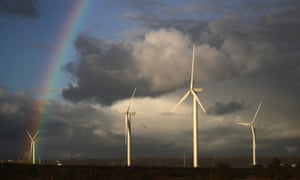British wind farms generated more electricity than coal plants on
more than 75% of days this year, an analysis of energy figures has
shown.
Solar also outperformed coal more than half the time, the data provided by website MyGridGB revealed.
Overall, renewables provided more power than coal plants on 315 days in 2017, figures up to 12 December showed. Wind beat coal on 263 days, and solar outperformed the fossil fuel on 180 days.
Between April and August inclusive, coal generation exceeded solar on only 10 days.
In total, renewables generated more than three times the amount of electricity as coal over the year to 12 December.
The figures – provided by BM Reports and Sheffield University – reflect a year in which a number of green records have been set for the power sector, including the first full day without any coal power in the system, record solar generation and tumbling prices for new offshore wind farms.
The government has committed to phasing out coal power that does not have technology to capture and permanently store its carbon emissions by 2025, as part of efforts to meet targets on greenhouse gases.
The focus now turns to gas, with daily output from wind outstripping gas on only two days of the year, and renewables overall – including wind, solar, biomass and hydropower – beating the fossil fuel on just 23 days.
Solar also outperformed coal more than half the time, the data provided by website MyGridGB revealed.
Overall, renewables provided more power than coal plants on 315 days in 2017, figures up to 12 December showed. Wind beat coal on 263 days, and solar outperformed the fossil fuel on 180 days.
Between April and August inclusive, coal generation exceeded solar on only 10 days.
In total, renewables generated more than three times the amount of electricity as coal over the year to 12 December.
The figures – provided by BM Reports and Sheffield University – reflect a year in which a number of green records have been set for the power sector, including the first full day without any coal power in the system, record solar generation and tumbling prices for new offshore wind farms.
The government has committed to phasing out coal power that does not have technology to capture and permanently store its carbon emissions by 2025, as part of efforts to meet targets on greenhouse gases.
The focus now turns to gas, with daily output from wind outstripping gas on only two days of the year, and renewables overall – including wind, solar, biomass and hydropower – beating the fossil fuel on just 23 days.
Dr Andrew Crossland from MyGridGB and the Durham Energy Institute said: “The government has focused on reducing coal use which now supplies less than 7% of our electricity. However, if we continue to use gas at the rate that we do, then Britain will miss carbon targets and be dangerously exposed to supply and price risks in the international gas markets.
“Clearly, refreshed government support for low-carbon alternatives is now needed to avoid price and supply shocks for our heat and electricity supplies.”
Emma Pinchbeck, executive director at industry body RenewableUK, said the decision to phase out coal was being made possible by a homegrown renewables industry “coming into its own”.
She added: “We want to see more boldness from the Conservative government. In 2018, the government should move to allow onshore wind, now the cheapest form of power for consumers, to be developed in parts of the UK where it is wanted, and agree an ambitious sector deal with the offshore wind industry.
“The new year could be the first in a golden age for UK renewables.”

No comments:
Post a Comment